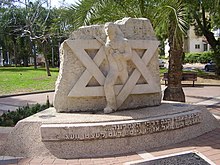This article includes a list of general references, but it lacks sufficient corresponding inline citations. (May 2021) |
"Zog nit keyn mol" (Never Say; Yiddish: זאָג ניט קיין מאָל, [zɔg nit kɛjn mɔl]) sometimes "Zog nit keynmol" or "Partizaner lid" [Partisan Song]) is a Yiddish song considered one of the chief anthems of Holocaust survivors and is sung in memorial services around the world.
| "Zog nit keyn mol" | |
|---|---|
| Song | |
| Language | Yiddish |
| Songwriter(s) | Hirsh Glick |


History
editThe lyrics of the song were written in 1943 by Hirsh Glick, a young Jewish inmate of the Vilna Ghetto, for the Vilna Jewish United Partisan Organization (FPO).[1][2] The title means "Never Say" (lit. "don't say —[n]ever"), and derives from the first line of the song.
Glick's lyrics were set to music from a pre-war Soviet song written by Pokrass brothers, Dmitri and Daniil, originally "Терская походная" ("Terek Cossacks' March Song"), later renamed into "Cossacks' Song", later titled by its first line as "То не тучи - грозовые облака" (Those aren't clouds but thunderclouds), lyrics by Alexey Surkov. The original song itself has a history, typical of the Soviet times. The song was written in fall 1936 and first performed in the 1937 Soviet documentary "Sons of the Working People" about the 1936 military exercise of the Red Army. The title of the film alludes at the Red Army oath of allegiance: "I, a son of the working people, <etc...>" ("Я, сын трудового народа...") The song title refers to "6-я казачья кавалерийская Кубанско-Терская Чонгарская дивизия имени Буденного" aka the 6th Cavalry Division.
The film was released in early May, but it was soon quietly removed from the distribution, supposedly because it featured marshals Tukhachevsky and Uborevich, repressed in late May 1937 (Case of the Trotskyist Anti-Soviet Military Organization), and they began to "vanish". At the same time, the November release of a disk in which Leonid Utyosov was performing this song was removed from the distribution and replaced in December with another one, in which the film, where song originated, was not mentioned. The title "Those aren't clouds..." was used in the 1939th release of Utyosov's performance of the song. The melody of the song has nothing with traditional Cossack songs, but rather based on typical Jewish harmonies.[3] Some find traces of Oyfn Pripetshik in it. [citation needed]
Glick was inspired to write the song by news of the Warsaw Ghetto Uprising.[2] During World War II, "Zog nit keyn mol" was adopted by a number of Jewish partisan groups operating in Eastern Europe. It became a symbol of resistance against Nazi Germany's persecution of the Jews and the Holocaust.
In the Soviet Union, the song was first publicly performed in 1949 by Paul Robeson under the title "The Song of the Warsaw Ghetto", sung part in English, part in Yiddish. The melody was immediately recognized by the listeners. (Probably this was an origin of the error in some sources which claim that the song was written in Warsaw Ghetto.) While the verse was translated into Russian in the Soviet Union, the song was never performed there again, neither in Russian, nor in Yiddish.[3]
Lyrics
editOriginal lyrics
editThis section is a candidate for copying over to Wikisource. If the section can be edited into encyclopedic content, rather than merely a copy of the source text, please do so and remove this message. Otherwise, you can help by formatting it per the Wikisource guidelines in preparation for the duplication. |
|
Yiddish in transliteration Zog nit keyn mol, az du geyst dem letstn veg,
|
English translation Never say that you're going your last way |
Original Yiddish ,זאָג ניט קיין מאָל, אַז דו גייסט דעם לעצטן וועג |
Hebrew Translation by Avraham Shlonsky אַל נָא תֹּאמַר: "הִנֵּה דַּרְכִּי הָאַחֲרוֹנָה,
|
See also
edit- Bella ciao – Italian partisan song
- Bandiera Rossa – Italian revolutionary song
- Fischia il vento – song associated with the Italian partisans
- Siamo i ribelli della montagna – Italian partisan song
References
edit- ^ ""Zog nit keyn mol" (Never Say) | Music of the Holocaust". Yad Vashem. Retrieved 2022-02-03.
- ^ a b Gilbert, Shirli (2008). "Buried Monuments: Yiddish Songs and Holocaust Memory". History Workshop Journal (66): 121. ISSN 1363-3554. JSTOR 25473010 – via JSTOR.
- ^ a b Nikolay Ovsyannikov, "От терской походной до еврейской партизанской", Aleph Magazine, March 7, 2021
- ^ Note: The original text uses the term נאַגאַן, nagan, referring to the Nagant M1895 pistol, produced in the Soviet Union and used in great numbers during World War II.
- Fisher, Adam. An Everlasting Name: A Service for Remembering the Shoah. West Orange, NJ: Behrman House, 1991.
- Kalisch, Shoshana and Barbara Meister. Yes, We Sang! Songs of the Ghettos and Concentration Camps. New York: Harper & Row, 1985.
External links
edit- Music and the Holocaust - Zog Nit Keynmol with archive recording by Dr David Boder.
- "Zog Nit Keynmol" Zemerl.com.
- זאָג נישט קיינמאָל! Yiddish text.
- Songs of the Holocaust[permanent dead link]
- Music of the Partisans
- Leaden Skies, musical physical theater work
- Oral history interview and recording of Zog Nit Keynmol from the Yiddish Book Center